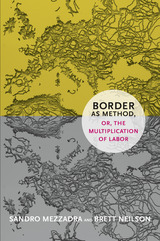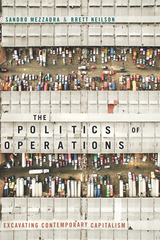3 books about Neilson, Brett

Border as Method, or, the Multiplication of Labor
Sandro Mezzadra and Brett Neilson
Duke University Press, 2013
Far from creating a borderless world, contemporary globalization has generated a proliferation of borders. In Border as Method, Sandro Mezzadra and Brett Neilson chart this proliferation, investigating its implications for migratory movements, capitalist transformations, and political life. They explore the atmospheric violence that surrounds borderlands and border struggles across various geographical scales, illustrating their theoretical arguments with illuminating case studies drawn from Europe, Asia, the Pacific, the Americas, and elsewhere. Mezzadra and Neilson approach the border not only as a research object but also as an epistemic framework. Their use of the border as method enables new perspectives on the crisis and transformations of the nation-state, as well as powerful reassessments of political concepts such as citizenship and sovereignty.
[more]

Free Trade In The Bermuda Triangle
And Other Tales Of Counterglobalization
Brett Neilson
University of Minnesota Press, 2003
Shangri-La, the Bermuda Triangle, Transylvania, the Golden Triangle—far-flung in popular conception, these anomalous places nonetheless occupy the same mysterious zone, a mythography of unruly cartographic practices. And because this mythography becomes associated with a particular area of the earth’s surface, it may well suggest an alternative means of mapping the world, dissociated from the dominant geographical paradigms of nation-state, economic region, and the global/local marketing nexus. Large-scale nonnational geographical spaces that find their genesis in popular feeling, mystery, and belief, these four sites provide Brett Neilson with the basis not only for rethinking the current global reorganization of space and time but also for questioning the dominant narrative by which globalization marks the victory of capitalism. Free Trade in the Bermuda Triangle moves between analysis of popular fantasies and engagement with on-the-ground realities, weaving together topics as diverse as airplane disasters off the U.S. Atlantic coast, the global drug trade, vampire culture in postsocialist Europe, and the search for utopia in Chinese-occupied Tibet. The study of globalization is largely a solemn affair, occupied with increasing economic polarities, environmental degradation, and global insecurity. Free Trade in the Bermuda Triangle maintains a critical focus on these sobering issues but at the same time asks how popular pleasure and enjoyment can create viable alternatives to the current global order. Neilson takes seriously the proposition that capitalism must be contested at its own level of generality, finding provisional grounds for resistance in nonlocal transnational spaces that embody quotidian hopes, desires, and anxieties. By studying the real and imagined dimensions of these popular geographies, his book seeks resources for social betterment in the fallen mythologies of the contemporary postutopian world.Brett Neilson is senior lecturer in the School of Humanities at the University of Western Sydney, where he is also a member of the Centre for Cultural Research.
[more]

The Politics of Operations
Excavating Contemporary Capitalism
Sandro Mezzadra and Brett Neilson
Duke University Press, 2019
In The Politics of Operations Sandro Mezzadra and Brett Neilson investigate how capital reshapes its relation with politics through operations that enable the extraction and exploitation of mineral resources, labor, data, and cultures. They show how capital—which they theorize as a direct political actor—operates through the logistical organization of relations between people, property, and objects as well as through the penetration of financialization into all realms of economic life. Mezzadra and Neilson present a capacious analysis of a wide range of issues, from racial capitalism, the convergence of neoliberalism and nationalism, and Marx's concept of aggregate capital to the financial crisis of 2008 and how colonialism, empire, and globalization have shaped the modern state since World War II. In so doing, they illustrate the distinctive rationality and logics of contemporary capitalism while calling for a politics based on collective institutions that exist outside the state.
[more]
READERS
Browse our collection.
PUBLISHERS
See BiblioVault's publisher services.
STUDENT SERVICES
Files for college accessibility offices.
UChicago Accessibility Resources
home | accessibility | search | about | contact us
BiblioVault ® 2001 - 2024
The University of Chicago Press









